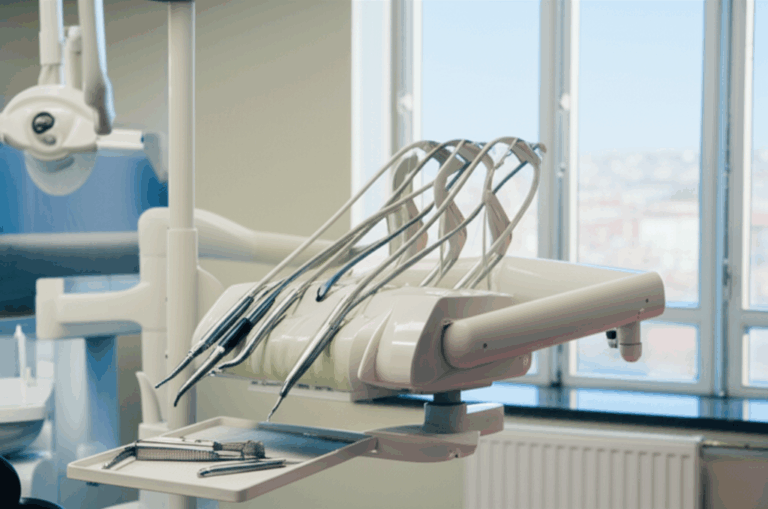
How to Work as a Foreign Dentist in the UK: Your Comprehensive Guide
1. Introduction: Opportunities for International Dentists in the UK
When I started planning my move to the UK, I needed clear, step-by-step guidance. I wanted to know what comes first, why it matters, and what to expect. The UK has lots of chances for foreign dentists. Demand is big in many areas. The process takes effort, but if you keep at it, you can make a good career here.
Why the UK? Here’s why I picked it: high standards, a mix of NHS and private jobs so you can choose your path, and a simple path set out by the General Dental Council (GDC). The steps can feel tough sometimes, but the process taught me a lot and made me better at my job. I want to help you avoid the mistakes I made and give you the tips I wish I knew earlier.
Table of Contents
2. Essential First Step: GDC Registration for Overseas Dentists
Before you do any dental work in the UK, you need to sign up with the General Dental Council (GDC). You can’t practice without this. Everything else depends on this first step.
2.1 Understanding the General Dental Council (GDC)
The GDC is the group in charge of all UK dentists and dental care workers. They set the rules, approve training, and make sure dentists are fit to work. To work as a dentist, your name must be on the GDC Dentists Register. GDC also checks your English skills, CPD (learning) rules, and has guidance for how you should behave. Think of the GDC as the main boss for dentists.
Other groups count too. NHS England handles contracts for dentists in England. The Care Quality Commission (CQC) checks dental clinics for safety in England. The British Dental Association (BDA) stands up for dentists. The Professional Standards Authority (PSA) checks over bodies like the GDC. You’ll hear these names a lot.
2.2 Eligibility Pathways for International Graduates
Here’s the short version:
- If you studied dentistry in the UK, or you have a degree the UK accepts, you can sign up straight away.
- If you trained in the EEA and your degree used to be accepted, your path might be different now. Brexit changed things, so check the GDC website for the latest info.
- If you got your degree outside the UK and your qualification isn’t on the accepted list, you’ll need to pass the Overseas Registration Exam (ORE) or the Licentiate in Dental Surgery (LDS) with the Royal College of Surgeons of England (RCS Eng). Most foreign dentists need ORE or LDS.
The GDC’s official rules for foreign dentists are detailed. Read every line. It kept me from making mistakes and delays.
Big heads up: PLAB is NOT for dentists! PLAB is a doctor’s exam, not for dental people. Dentists take ORE or LDS only.
2.3 English Language Requirements: IELTS and OET
You must prove you speak good English. You can do this by:
- Passing IELTS Academic with at least a 7.0 total and no part less than 6.5
- Doing the OET (Occupational English Test) with at least a Grade B in every section
Some people can use proof like a dental degree taught fully in English in certain countries. Check the GDC website for what counts. I did IELTS because I also needed it for my visa.
My tip: take a practice IELTS or OET first. If your score is low, you have time to improve without messing up your main exam plans.
2.4 Certificate of Good Standing (CGS) and Key Documents
The GDC wants a Certificate of Good Standing from the group that’s in charge of dentists in your country. This proves you have no problems on your record. It only lasts a short while. Order it when you really need it so it won’t expire before the GDC sees it.
Documents I made sure were ready and correct:
- Passport/ID
- Dental degree and school marks
- Course syllabus if GDC asks
- Internship or house officer letter if you did this
- Proof of dental work and job references
- English test results
- Certificate of Good Standing
- Recent learning evidence (CPD)
- Name change paper (if any)
Check all dates and spellings match across every document. This saved me a lot of waiting time.
3. The Qualification Exams: ORE vs. LDS
This is a big choice and it shapes your year or more. Both exams check what you know and what you can do. Both are tough. Pick based on which exam slot you can find, cost, travel, and timings.
3.1 Overseas Registration Exam (ORE): Format, Process, Prep
The ORE has two parts.
- Part 1 is written. It checks what you know with multiple-choice questions, split into two papers—one on clinical knowledge and one on human disease. The questions can be detailed, not just simple facts.
- Part 2 is practical. It looks at things like operative skills, diagnosis, planning, how you talk to patients, emergencies, and professionalism. You’ll get OSCEs, patient actors, simulated work (like crown or root canal practice), and case discussions.
Booking can be tricky—spaces fill up fast. Set reminders and keep all files ready. Exam places and prices can change, so always check on the GDC website. The pass rates change each year. In my time, Part 1 was harder for many people. Good preparation makes a real difference.
Here’s how I got ready:
- GDC exam info and candidate booklets
- Latest SDCEP guidelines for things like medications, cleaning, and sedation
- UK rules for infection control and health emergencies
- British Dental Journal (BDJ) for news and updates
- ORE study courses, especially for hands-on and communication stations
- Study groups for talking about rules, ethics, and UK ways of working
I practiced practical tasks on models with a timer. I made flash cards for things to watch out for. I practiced UK-style patient conversations with friends.
3.2 Licentiate in Dental Surgery (LDS RCS Eng): How it Differs
The LDS is run by the Royal College of Surgeons of England and is another way. It’s a bit like the ORE—with written and hands-on parts—but it’s run and booked differently. For some, LDS dates come up faster when ORE is full. Others like that it’s run by a Royal College.
Check these main things before you pick:
- When and how to apply
- How much it costs and refund rules
- What topics and types of stations are used
- Where and when the test happens
I met people who chose LDS over ORE (and vice versa), and both can work out. Pick what suits your own plan.
3.3 Choosing the Right Exam Pathway and Preparation Strategy
I looked at three things:
- Can I get a spot in my timeline?
- Is it in my price range (including re-takes, travel, etc.)
- Do I have people or a group who can help me practice for that exam?
I planned for about 6 months to get ready for Part 1, and about 6 to 9 months for Part 2, including lots of practical practice. I did mock exams every two weeks near the end. Keeping to a routine worked better than last-minute cramming.
4. UK Visa and Immigration for Dentists
Passing ORE or LDS doesn’t let you start work right away. You still need the right visa. For most, this is the Skilled Worker visa.
4.1 The Skilled Worker Visa (used to be Tier 2 General)
What you need:
- A UK job offer from an employer who has a Sponsor Licence
- This employer gives you a Certificate of Sponsorship (CoS) for being a dentist
- The job and pay must meet Home Office rules
- You pay the visa cost and the Immigration Health Surcharge (IHS), unless you are exempt such as in some health roles
Most dentists work as associates. Not all places can offer sponsorship. Bigger dental companies and NHS clinics usually have licences. Some small places do too, but they need to apply for a licence if they want to sponsor you—which takes time and money.
Make sure to allow for processing time for documents, visa appointments, and decisions. The Home Office now uses digital status a lot, so you’ll handle your visa online. BRPs are being phased out. Check the latest government advice before you apply.
4.2 Other Visa Routes (Graduate, Family, ILR)
Other options include:
- Graduate visa. If you finish a UK postgrad degree, you might get a Graduate visa, which lets you work without sponsorship for a set time.
- Family or Spouse visa. If you join a partner here, you can work once you get this visa, with no need for sponsorship.
- Indefinite Leave to Remain (ILR). After some years you can settle in the UK if you meet the requirements.
Visa rules can change. I check the UK government site often, and I read all their info before making big decisions.
4.3 Key Documents for Your Visa Application
Have a good bundle to avoid problems.
- Current passport
- Certificate of Sponsorship (CoS)
- English test proof (unless you’re exempt)
- Tuberculosis test results if needed
- GDC registration or proof it’s being sorted if your employer is okay with that
- Bank account proof if needed (some sponsors cover this)
- Police check if asked
- IHS payment receipt
- Any other things listed for your visa
I sometimes wrote a simple letter listing every document for the caseworker. It helped them and can speed things up.
5. Finding Your First Dental Job in the UK
You’ve passed your exams. You have, or will soon have, your visa. Next is that first job—a big step in your career.
5.1 Understanding the UK Dental Job Market
The UK has jobs in NHS clinics, private clinics, mixed places, community dental teams, and hospitals (for further training). Most overseas dentists start as associates in clinics that do both NHS and private work. In England, you’ll hear a lot about UDAs (Units of Dental Activity)—these decide NHS pay inside practices. Your pay depends on UDA rate, your contract, and if you hit targets. Scotland, Wales, and Northern Ireland use different rules.
Work demand changes by location. City centres may have lots of dentists and feel crowded. Rural areas, small towns, and parts of Scotland or Wales often have more jobs available and less competition. If you’re flexible about where you live, you may earn more and settle faster.
5.2 Where to Search for Dental Roles
Here’s where I looked:
- NHS Jobs and local NHS Trusts for salaried roles
- BDJ Jobs, Indeed, LinkedIn, and dental job sites
- Dental agencies who help foreign dentists find jobs
- Groups and local meetups for job leads or PLVE roles
- Directly asking practices with Sponsor Licences
The BDA is also good for job info and contract advice. Local dental committees sometimes share openings.
5.3 Sponsorship Opportunities
Look for employers who already have a Sponsor Licence. Ask about this early on. Big dental groups and NHS outfits often sponsor. Some small practices too. If they say “yes” but don’t have a licence yet, ask how and when they’ll get one, and write down all plans.
I made a simple pack to hand out: GDC number or progress, exam results, English score, CV, job references, and a short note on why I wanted that job or area.
5.4 Preparing Your CV and Cover Letter
UK bosses look at CVs quickly. Keep yours to two pages, max!
- Short intro: what you do and what you want
- Registration: GDC number or pending
- Exams: ORE or LDS, with dates
- Study: degree, place, dates
- Work: short bullet points about what you did, type of patients
- Skills: endo, dentures, tooth removal, work with kids, etc
- CPD: recent courses
- References: available if needed or name two
Keep the cover letter short and personal to that place. Show that you have read about their clinic and know why you’d fit in.
5.5 Interview Preparation Tips
Expect a mix of clinical, ethics, and UK-specific rules.
- Consent, safeguarding, and keeping patient records
- Emergencies, infection control, and cleaning
- Antibiotic use—follow SDCEP guidelines
- X-rays and radiation rules (IR(ME)R)
- Complaints and honesty with patients
- NHS contract basics if you’ll do NHS work
- Talking with nervous patients or children
I practiced with a friend acting as the boss. I made a basic folder showing a few cases—like crowns or white fillings—nothing fancy.
6. Post-Registration and Integration: What to Expect
Once you start working, the real learning begins. The UK system has its own ways, but you’ll get used to them.
6.1 Dental Foundation Training (DFT) / Vocational Training (VT)
A big question—do you need DFT or VT? If you want to work in NHS clinics in England, you need to get on the NHS Performer List. UK graduates do DFT after university. Foreign-trained dentists usually do PLVE (Performer List Validation by Experience), where you’re checked on your work as you go. When you pass PLVE, you can get onto the Performer List if you meet the grade.
Scotland, Wales, and Northern Ireland have their own versions, so check locally. Ask Health Education England (HEE) or your clinic about the PLVE process. The right clinic can make your experience much smoother.
6.2 Indemnity Insurance and Professional Defence Organisations
You must have dental insurance to protect yourself. The main groups are:
- Dental Defence Union (DDU)
- Medical and Dental Defence Union of Scotland (MDDUS)
- Dental Protection
Check prices, and see if the insurance covers extra things like implants, sedation, or kids. Make sure they help if you have a complaint or problem with the GDC. Don’t go cheap here—it’s worth paying for peace of mind.
6.3 Continuing Professional Development (CPD)
GDC sets the CPD rules. You need a learning plan, do training courses, and keep records. Early topics I did were:
- Emergencies and basic life-saving
- Cleaning and infection control
- Protecting children and vulnerable adults
- X-ray and radiation safety
- Good patient notes and consent talks
- Right use of antibiotics (SDCEP)
The College of General Dentistry has good learning paths. Keep reading the British Dental Journal (BDJ) for the latest. Careful CPD records are needed—GDC can ask for them anytime.
6.4 Understanding UK Dental Regulations and Ethics
Here’s the basics:
- GDC Standards for the Dental Team
- CQC rules if you work in England
- NHS contract rules for NHS work
- Health and safety, IR(ME)R and RIDDOR laws
- Data protection (UK GDPR) and keeping patient info private
If you want to buy a clinic in the future, you need extra checks like registering with CQC and setting up safety systems. For daily clinical work, follow SDCEP, NICE, and other guides. You’ll get used to the proper paperwork and ways of doing things.
6.5 Financial Considerations: Salary, Tax, and Living Costs
Lots of people want to know about money. Pay changes a lot.
- NHS associates get paid by UDA (Unit of Dental Activity) contracts. Pay depends on the UDA rate, your contract, and if you meet targets.
- Private dentists are paid by a slice of what they earn, minus costs for lab work sometimes. If you do more cosmetic or implant work, you might earn more.
- Salaried jobs (community or hospital) are steady and come with pensions.
Usual starting pay can be around the middle of five figures and go up with experience and patient numbers. London jobs pay more, but living there is expensive too. Rural places may be better for take-home pay.
You’ll pay tax and National Insurance (NI) either as an employee (PAYE) or by filing your own taxes (self-employed). Keep some money back for tax. If you can, get a dental accountant. NHS pension applies to some jobs—check your contract.
6.6 Clinical Workflow Tips: Labs, Digital Dentistry, and Team Culture
I settled in faster by talking with my dental technicians and team. You’re not treating alone; your nurses and lab help a lot. I worked with one digital dental lab to get my crowns right every time. If your clinic uses digital scanners or CAD/CAM, learn it! It saves a lot of time and remake troubles.
If you want to see how a modern dental lab works in the UK, it pays to learn about lab setups and clear communication. Here are some good resources for dental pros looking to work with labs:
- Look at how a digital dental lab in the UK runs for digital and scanner setups
- For implant work, check out what’s involved at an implant dental laboratory
- If you use 3D printed guides or models, read about a 3D dental lab
If your lab is not in the UK, make sure they follow the UK’s rules for medical devices and have proper paperwork. Always keep good notes and photos for lab jobs.
7. Common Challenges and How to Overcome Them
This path can be tough but you can do it!
7.1 Exam Stress and Retakes
I failed a practice exam once and felt shaken. I did two things: less social time for a while, and more practice under timed conditions. I also had a rest day each week. My marks jumped up. If you fail a real exam, it’s okay. Look at what went wrong, change how you study, and know plenty of dentists passed on their second try.
7.2 Adapting to the UK Dental System
The first month feels like learning to drive on the other side of the road. I had to switch from long, wordy notes to quick templates. My antibiotics matched SDCEP, which made choosing easier. I practiced consent talks. I learnt each step of decontamination. Give yourself time and ask your nurse for tips—they know the daily flow best.
7.3 Cultural Integration and Support Networks
Patients like clear, simple talk and a bit of humor. I learned to let quiet moments happen after giving care plans, so people could think before asking questions.
Connect with others. The BDA has good advice, and there are local study groups, WhatsApp groups, and meetups. Read BDJ for updates and NHS news. Ask for help early if you feel lost. It’s a sign of strength.
8. Conclusion: Your Journey to Becoming a UK Dentist
Here’s a simple summary:
- Start with the GDC. Check you qualify and have English proof.
- Pick your exam route: ORE or LDS. Plan time for both parts.
- Work out your visa needs. Skilled Worker Sponsorship is common. Get all documents ready.
- Find the right jobs. Learn about NHS and private work. Get ready for UK interviews.
- If you want NHS work, do PLVE and get the Performer Number.
- Get insurance, keep learning, and build good habits for paperwork and safety.
- Meet others—labs, mentors, and groups will help you a lot.
It takes time and patience, but it’s worth it in the end.
9. FAQs
Q: Can I work as a dental hygienist or therapist if my dental degree isn’t enough for dentist registration?
A: Sometimes foreign dentists take jobs as hygienists, therapists, or dental nurses while getting ready for ORE or LDS. These jobs need their own GDC checking. Read the rules before you make a plan.
Q: How long does it all take?
A: It depends—a lot. Most people need anywhere from 1 to 3 years from starting to when they get their first UK dental job. Exam dates and visa waits matter too.
Q: Any fast routes?
A: There’s no real shortcut past the GDC’s rules. If your degree is on their accepted list, you can be quicker. Some do a UK postgrad degree and use a Graduate visa, but you still need full GDC registration.
Q: Best cities for new dentists in the UK?
A: Depends what you want. London and Manchester are big but busy with lots of dentists. Scotland, Wales, the North East, and many rural areas need more dentists and have less competition. You might move up quicker outside big cities.
Q: Do I need DFT for NHS work?
A: Most foreign-trained dentists do PLVE to get on the NHS Performer List. UK grads do DFT. Your local deanery will tell you what to do.
Q: What’s the pay like?
A: Changes a lot based on NHS vs private, where you are, and what you can do. Mid five figures when starting is common. With time and more private work, it can get to six figures.
Q: Is PLAB needed for dentists?
A: No, PLAB is just for doctors.
Q: Which English test for GDC?
A: IELTS (7.0, no less than 6.5 in any part) or OET (Grade B in all parts). Check the GDC site for any changes before you book.
Q: How do I find visa sponsors?
A: Look for jobs that say “visa sponsorship available” and ask in the interview. Have all your documents and be clear to make it easy for them.
Q: Can I buy my own dental clinic?
A: Yes, but only if you hold GDC registration, a visa for self-employed/business, CQC registration, and funding. Get local help with finance and law.
Q: Who are the main groups I should know about?
A: GDC, BDA, NHS England, CGDent, SDCEP, PSA, and defence insurances (DDU, MDDUS or Dental Protection). If you work or buy a clinic in England, you’ll also deal with the CQC.
Q: What about police checks and NI Numbers?
A: Most jobs ask for a Disclosure and Barring Service (DBS) check before you start, and you need an NI (National Insurance) number for tax/pay. Your manager can help.
Last note: Always check the latest official info, as rules and exam details can change. Make a plan and stick to it—you’ll get there.
(This guide is based on my own experience and official sources like the GDC, NHS, and UKVI. Always double-check with the right authorities before you make big choices. This is friendly advice; it’s not the same as legal or migration help.)








